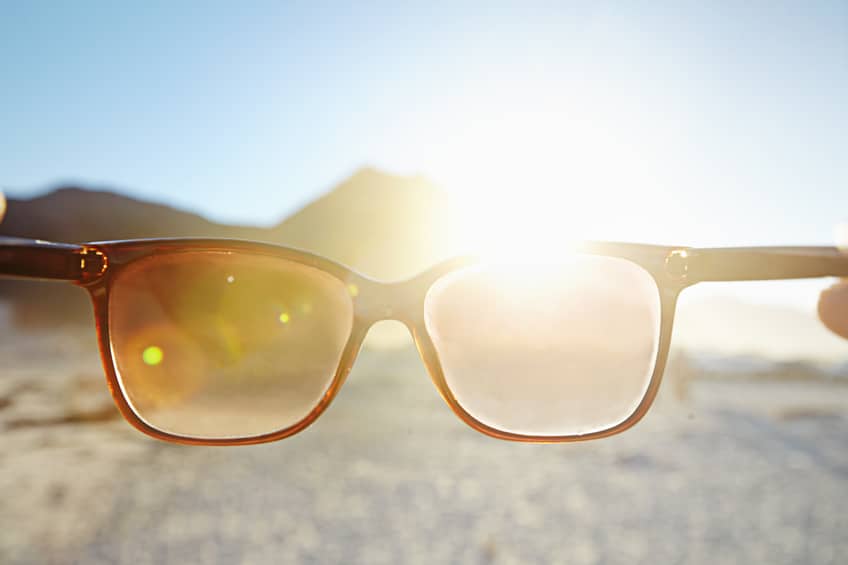How Important Is UV Coating for Eyewear?
During the manufacturing process, UV protection is obtained by coating sunglasses and eyeglass lenses. UV protection on sunglasses and eyeglass lenses protects your eyes and skin from the harmful ultraviolet radiation emitted by the sun. As a result of UV protection on your glasses and sunglasses lenses, you are better able to protect your eyes from the harmful effects of UV radiation.
The UV-protection coating of sunglasses and glasses provides the best protection for your eyes outdoors by blocking UVA and UVB rays. This coating is applied to plastic or glass lenses to provide maximum protection.
UV Radiation Types
A variety of ultraviolet radiation exists, including UVA rays, UVB rays, and UVC rays. UVA rays as well as UVB rays (or simply UV radiation) can damage your eyes and your vision both short- and long-term. This makes UVA and UVB rays a target for UV protection in sunglasses and glasses. As a result of the ozone layer absorbing UVC radiation, it is considered a minimal threat.
UV radiation is primarily caused by the sun, but welding equipment, tanning beds, and lasers can also produce UV rays. You will need to wear special eye protection beyond regular sunglasses in these situations.
What is the need for UV coating on my sunglasses?
Sunglasses and eyeglasses with UV protection significantly reduce the amount of harmful ultraviolet radiation that enters your eyes without wearing UV-protective lenses. Short-term exposure to ultraviolet radiation without wearing UV-protective lenses can cause damage to your eyes that is similar to sunburn.
The condition is known as photokeratitis, and the symptoms include redness and puffiness in the eyes. The eyes may also feel gritty, as if they contain sand. The excessive tearing may also occur if you are very sensitive to light.
Nevertheless, you may be at an increased risk of developing cataracts or macular degeneration if you are exposed to long-term UV radiation without proper protection.
What level of UV protection should my sunglasses provide?
You should be able to verify how much UV protection your sunglasses provide from the sticker or product information included with the sunglasses I suggest that they are labeled UV400 or provide 100% protection against the sun’s UV rays.
It is not necessarily necessary for sunglasses to provide UV radiation protection even if they are dark enough to block visible light. In fact, it may be more dangerous than not wearing sunglasses to wear dark shades without UV protection. As a result of the dark tint, your pupils will appear larger in the sun, which can result in more damage to your eyes.
What are the best sunglasses for UV protection?
Sunglasses with a wraparound profile, or those with a curved profile, offer the greatest level of UV protection due to their curves that allow them to curve around your features to provide adequate protection from direct sunlight as well as peripheral light.
Some of our top performance brands, such as Smith, Oakley, and Maui Jim, make wraparound frames with three, five, and eight base wraps. Even though wide rectangular frames are most commonly found, you can find sleek wraparound styles with oval or rounded lenses as well. In addition to providing the most protection, these frames ensure that your frames remain balanced and comfortable throughout high-octane activities.
Is UV protection provided by safety glasses?
A UV-protective coating can likely be added to new safety glasses during production if they are made of polycarbonate or a similar material.
Is Polarization The Same As UV Protection?
When shopping for polarized sunglasses, it is important to ensure that UV protection is included since polarization and UV protection are different. Because polarization is typically only offered with sunglasses, companies tend to advertise them together. However, polarization alone cannot protect you from UV rays.
While the sun’s rays can often be reflected off of water, sand, snow, and buildings, polarization refers to a lens’ ability to reduce glare and haze in bright sunlight. When it comes to reducing glare around reflective surfaces, polarized lenses are typically most helpful.
Can Cleaning Or Heat Exposure Damage UV Protection?
When you get sunglasses with UV protection integrated into the lenses, no amount of lens cleaning or exposure to heat will affect their protective qualities. Look for brands known for the quality of their lenses, such as Wiley X, Maui Jim, or Ray-Ban, to get sunglasses that provide UV protection as standard.
Is UV Protection Necessary In Eyeglasses?
Fortunately, lenses do not need a dark tint to provide 100% UV protection if you plan to step outside with your glasses and not switch to shades. UV coatings are effective in blocking UV radiation regardless of whether the lenses are clear or tinted.
There is some protection you can get from the material of your lens. Polycarbonate lenses, for example, as well as other high-index plastics like Trivex inherently provide 100% UV protection. But regular plastic lenses must be coated with UV protection in order to provide their own protection.
Photochromic lenses, which darken automatically when exposed to direct sunlight, are already equipped with UV protection.
Does UV protection on glasses make a difference?
Yes, in fact, you may as well not wear sunglasses at all if you choose glasses without 100% UV protection. Adding a UV coating to your prescription lenses is easy, and many lenses come with one.
All polycarbonate lenses and high-index lenses come standard with our clear UV-protective coating. This coating protects your eyes from harmful UVA and UVB rays while maintaining the lens’ color.
What Other Types Of Light Protection Are Available In Eyeglasses?
Digital LED screens emit blue light, which may contribute to discomfort and glare after prolonged use. The blue light filtering lens treatment is one of the eye protection technologies we offer.
If you wear blue light filtering glasses while using your computer or tablet for long periods of time, you may experience a reduction in blue-violet light and an improvement in your sense of visual comfort.
Is UV Protection The Same As Blue Light Protection?
Blue light can be reduced by wearing sunglasses, but the tint of the sunglasses does not necessarily block the entire spectrum of blue light. Dark amber tinted sunglasses are most effective at reducing exposure to blue light from a digital screen.
You should choose sunglasses that provide 100% UV protection. This will probably also allow you to block some blue-violet light, also known as high-energy visible light (HEV).
You will be able to filter out much of the blue-violet light emitted by LED screens by adding a UV coating and blue light filtering coating to your eyeglasses. It may be worthwhile to choose both coatings to ensure extra protection, as blue-violet light is emitted by LED screens, while UV rays and blue-violet light are emitted by the sun.
For gamers and computer users who spend considerable time on screens, bronze, copper, or reddish-brown lenses are a good option to filter out more blue light and improve their eye comfort.
How Long Does UV Protection Last?
When purchasing eyewear, it is a good practice to replace it every few years, as UV protection can decrease over time. When shopping for the correct style, take into account the fit and temple coverage as well. For people who are regularly exposed to heavy, direct sunlight, these elements may provide additional protection.
Please double-check the details of the product to ensure that you are receiving complete coverage.
















